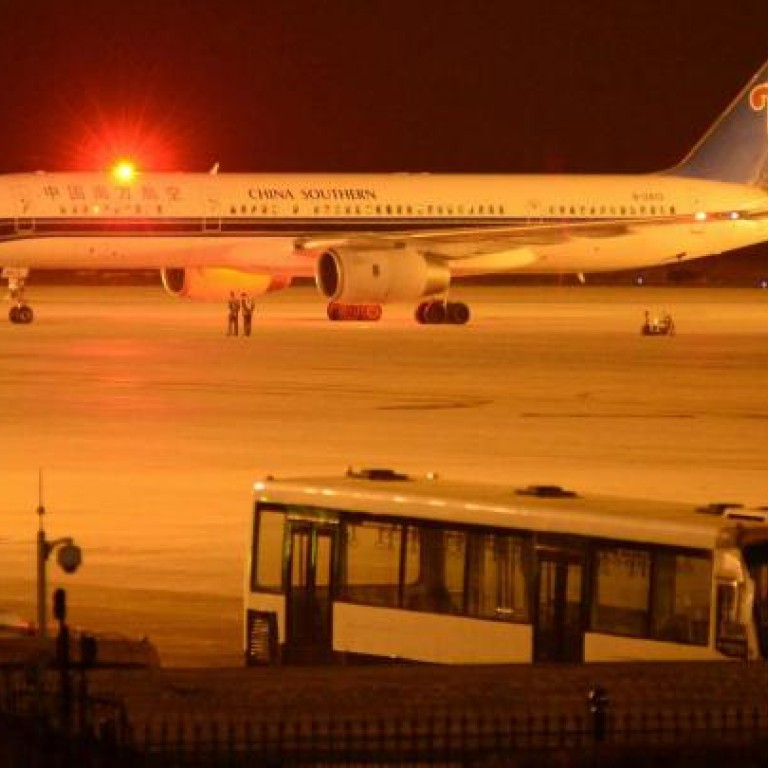
Series of hoax bomb threats disrupts China flights
After five incidents in two months, airline says government's emergency response capabilities will be exhausted by repeated threats
Mainland air travellers are dealing with disruptions caused by an increase in hoax bomb threats.
On Tuesday, Air China received fake bomb threats about two flights to Beijing - one from Lhasa , Tibet , and the other from Nanchang , Jiangxi - that were phoned in by a mentally ill man just before they were about to take off, causing hours of delay to hundreds of passengers, state media reported.
They were the fourth and fifth hoax bomb threats targeting mainland airlines in less than two months.
Professor Sun Ruishan, director of the Research Institute of Civil Aviation Safety in Tianjin , said such frequent threats were rare.
"I have not heard much about bomb hoaxes in China until recently," he said.
Passengers are the biggest victims of such hoax calls. More than 300 passengers on an Air China flight from Beijing to New York had to return to the capital on August 29, despite being more than three hours into the flight. Their identities and personal belongings were checked for hours by hundreds of security personnel at Beijing Capital International Airport.
"I was confused and terrified," a passenger told mainland travel magazine . "For a long time I couldn't get words such as bomb and terrorist out of my head."
China Southern Airlines spokesman Su Congyue said bomb hoaxes had a negative impact on normal operations. "It's definitely a headache," he said.
Chinese airlines have long been criticised by passengers for frequent delays due to bad weather and poor management. An industry expert, who declined to be named because of the sensitivity of the issue, said a sudden increase in bomb hoaxes could create a bottleneck that could force nationwide air traffic to a standstill.
Su said the government's emergency response capabilities could be exhausted by frequent bomb threats.
"It not only affects airlines but keeps the public security forces busy as well," he said. "As a policy, we will alert the police as soon as we receive a threat and they will launch an emergency response."
Hundreds, if not thousands, of government agents were mobilised each time a hoax triggered an alert, dealing with such things as bomb tracking and disposal, intelligence and counter-terrorism operations.
Sun said hoaxes posed a threat to air safety. He said that a bomb threat always had a negative impact on the mental state of air crew and ground-based air traffic controllers.
"Almost every emergency response produces chaos and chaos is the biggest enemy of air safety," he said.
The bloodiest lesson was the Tenerife airport disaster in Spain's Canary Islands 35 years ago. Amid confusion caused by an explosion and a subsequent bomb threat at nearby Gran Canaria airport, two Boeing 747s collided on the runway of Tenerife airport, killing 583 people. It was the deadliest aviation accident until the September 11, 2001 attacks, Sun said.
"A bomb hoax should be regarded as attempted murder," he said.
However, those who make hoax bomb threats receive relatively mild punishment on the mainland.
Most are jailed for less than two years and are not fined, while the same crime in the United States could result in up to 10 years in jail and a maximum fine of US$250,000.
Lawyer Zhang Qihuai, a visiting professor at the Civil Aviation University of China, wrote in his blog that hoax bomb threats were inspired or motivated by many things, from drunkenness to pranks, revenge on a former lover or to seek a ransom. One hoaxer who demanded a ransom was jailed for only 14 months by a Shanghai court.
Zhang told the that judges should impose tougher sentences to deter future hoaxes.
Professor Zhang Houcan, a psychologist at Beijing Normal University, said the recent increase in hoaxes could partly be blamed on the media giving heavy coverage to each incident. "This news should be reported, but not highlighted," she said.

